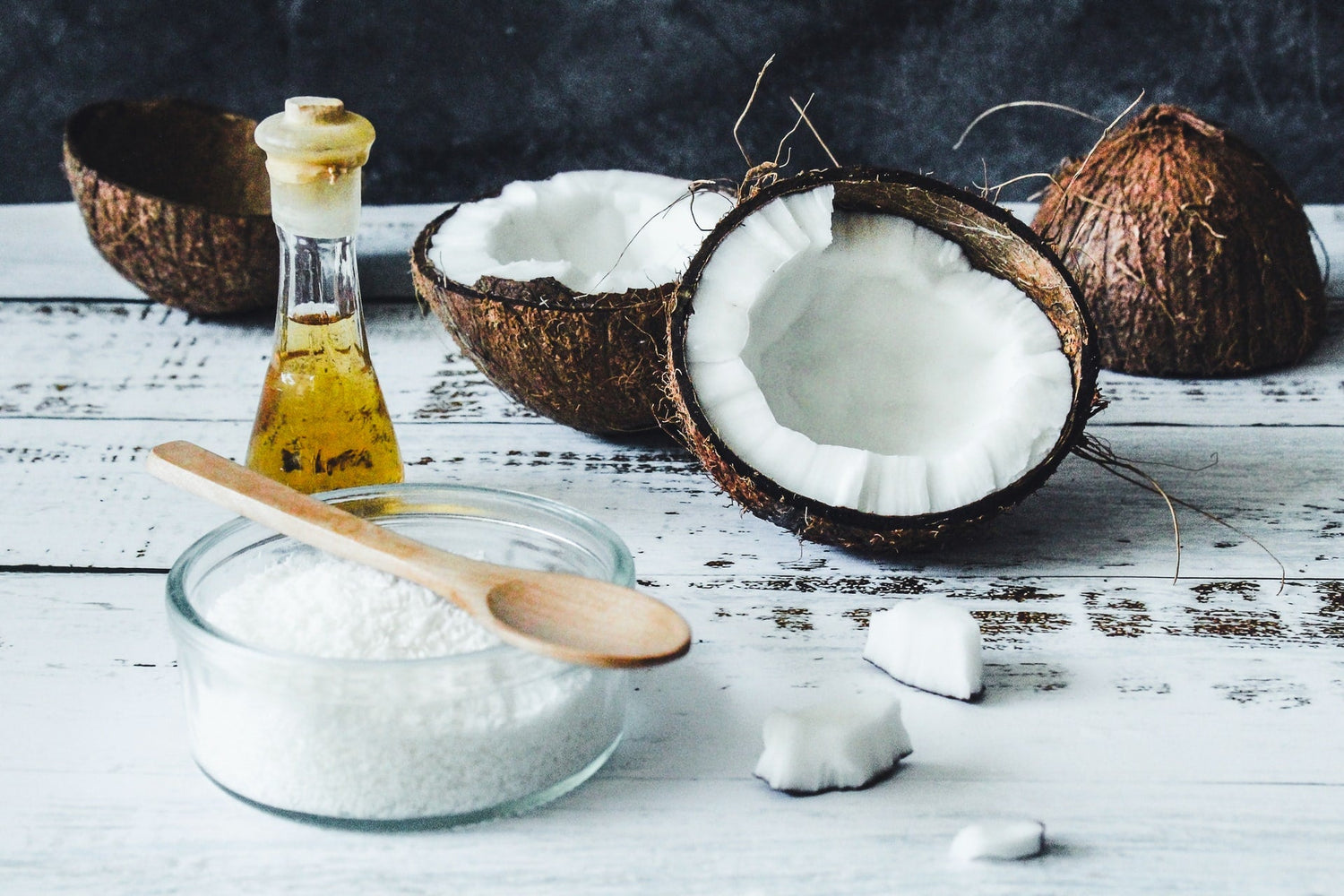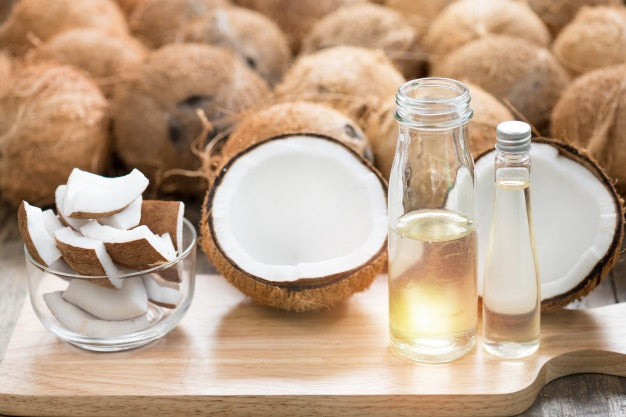Coconut oil has gained widespread popularity in recent years, but there's still a lot of confusion about the various kinds of coconut oil and how they differ. There are two main categories of coconut oil: unrefined (virgin) coconut oil and refined coconut oil.
Within these categories, coconut oils differ in the type of coconuts used and the method of oil extraction. There are multiple types (or grades) of coconut oil – just like olive oil. That's why it's important to choose the right grade of coconut oil according to your needs.
In this blog post, we’ll take a look at the common coconut oil terminology and explain the key elements of virgin coconut oil vs. refined coconut oil.

Virgin (Unrefined) Coconut Oil
Virgin coconut oil can be made from dried coconut kernel (the white flesh of the coconut), or freshly grated coconut kernel. Here's a brief explanation of each:
1. Virgin coconut oil derived from dried coconut. In this method, the fresh coconut kernel is dehydrated, allowing it to be stored for later processing. The coconut kernel is dried at a low heat between 158ᵒ F/70ᵒ C to 167ᵒ F /75ᵒ C and contains a moisture content between 10-11%. Dried coconut is pressed, usually via expeller pressing, to extract the coconut “milk” from the coconut. The oil is then extracted from the milk using heat. This method allows for easier mass production of virgin coconut oil.
2. Virgin coconut oil derived through a “wet-milling” process. With this method, the oil is extracted from fresh coconut kernel without drying it. Coconut “milk” is extracted by pressing the wet coconut kernel. The oil is then further separated from the coconut milk using various methods such as centrifuge, low heat, fermentation, or natural separation.
Refined Coconut Oil
Refined coconut oil is made from dried coconut kernel called copra. Copra is coconut kernel that has been dried via heat from smoke, sun, or kiln. Because refined coconut oil does not have a coconut oil taste or aroma, it is often used for cooking or baking when no coconut flavor is desired. It is also used for cosmetic purposes (in products such as shampoos, soaps, and lotions).
Refined (also referred to as RBD) coconut oils are solvent expelled, like Olive Pomace Oil, RBD Soybean, or RBD Canola Oil. There are some refined coconut oils that are expeller-pressed, but they are not common. Read all about how virgin and refined coconut oils are made in our previous post.
Refined coconut oil always undergoes additional processing, which removes the smell and taste of coconut. Because refined coconut oil uses chemicals during processing, they are not considered organic-certified coconut oils. In addition, because it is more highly processed, it has a higher smoke point of 400ᵒ F compared to virgin coconut oil, which makes refined coconut oil more suitable for high-heat frying.
For more information on how virgin and refined coconut oil are made, check out part 1 of this post, Understanding Virgin, Refined, and Unrefined Coconut Oil: How They’re Made Makes a Difference.
Virgin Coconut Oil vs. Refined Coconut Oil

The term “virgin” in coconut oil simply means unrefined. In coconut oil, the use of “extra virgin” is irrelevant and used erroneously. Unlike olive oil, where “extra virgin” refers to the first pressing, coconut meat is only pressed once to extract the milk from the oil. However, there is no official certification authority that determines or certifies coconut oils as “virgin” or “extra-virgin”, so this terminology is widely used on labels for marketing appeal.
Once produced, coconut oil can either be refined (like canola oil) or it can stay in its original unrefined state (like Extra Virgin Olive Oil). Unrefined oil maintains much of the coconut’s natural nutritional value, including polyphenols and antioxidants.
When comparing refined coconut oil to virgin coconut oil, virgin coconut oil has higher amounts of polyphenolic antioxidants such as caffeic acid, ferulic acid, syringic acid, catechin and epigallocatechin.1 Many health experts and veterinarians recommend using virgin coconut oil as a health supplement or in cooking.
The refining process is a high heat system that uses chemicals, hot steam, and filtering. It is also referred to as RBD oil, which stands for refined, bleached, and deodorized. This type of oil uses chemicals such as bleach, hexane, etc., in processing. The oil is also filtered, which removes any solid particles of coconut.
Virgin coconut oil is in a completely natural state because it has not been refined, bleached, or deodorized. Furthermore, if virgin coconut oil is unfiltered, there may be some small coconut particles in the oil.
How Do You Determine Quality?
It is difficult to truly determine the quality of coconut oil, specifically virgin coconut oil, because terminology used to describe coconut oil such as “cold-pressed”, “raw”, “virgin”, “extra-virgin” is ambiguous and obscure. This is due to the fact that there are no standards or regulations defined by the USDA or FDA for labeling coconut oil.
In addition to this, coconut oil nutritional labels do not list medium-chain fatty acid levels, or moisture content. However, if you are extremely familiar and experienced with various types of coconut oil, it is possible to detect variances in color, texture, smell, and flavor.
If you are unable to discern these characteristics and you want to know the quality of the brand of coconut oil you’re using, we suggest calling the company and asking for the following:
1. The MCFA content (capric, caprylic and lauric acids)
2. Coconut harvesting and kernel processing process
3. The extraction and pressing methods
4. The Certificate of Analysis for the batch of oil you have

At CocoTherapy, we believe that there are no shortcuts to producing true-cold pressed, raw, virgin coconut oil. With virgin coconut oil, as with other oils, the saying applies, “you get what you pay for''. As the demand for coconut oil increases, brokers are looking for ways to drive down the price. This often results in cheaper and lower-quality products entering the marketplace, and confusion among consumers due to misleading labels.
When it comes to coconut oil, “buyer beware” holds much significance as consumers have often been fooled into purchasing fake or adulterated (a blend of virgin and refined) coconut oils. Learn more about fake oils in our comprehensive post, Fake Oils: Virgin Olive Oils Can Fake It, and So Can Virgin Coconut Oils.
The CocoTherapy Difference
CocoTherapy Virgin Coconut Oil is produced in our family’s USDA organic certified facility using coconuts grown on our own organic-certified, non-GMO verified coconut farm for three generations. This means we know that the coconuts are tree-ripened for 12 months when harvested and processed within 4 hours after harvesting.
We use only fresh, wet-milled coconut, and cold press our oils. We also track every batch of virgin coconut oil we produce via lot numbers and have a Certificate of Analysis for each batch. In addition, we list the minimum amounts of MCFAs on our labels. This means that you can be sure our oil is a healthy nutritional supplement that meets the highest standards of production.
To learn more about how CocoTherapy Virgin Coconut Oil is different, click here.



